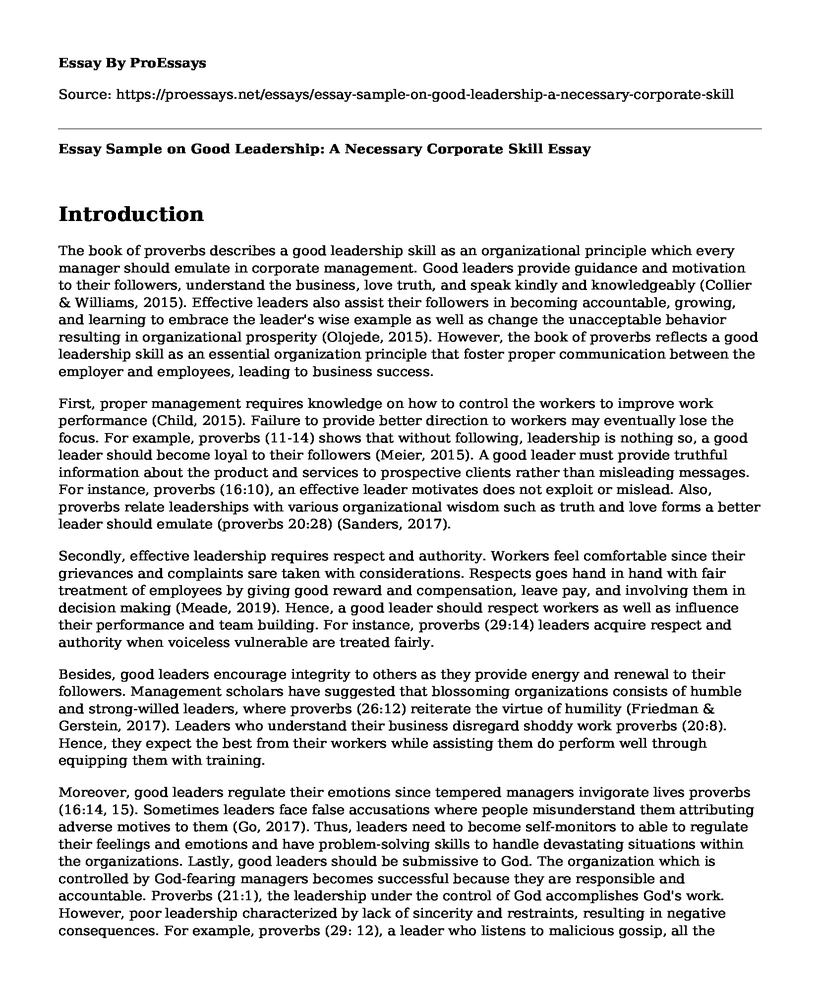Introduction
The book of proverbs describes a good leadership skill as an organizational principle which every manager should emulate in corporate management. Good leaders provide guidance and motivation to their followers, understand the business, love truth, and speak kindly and knowledgeably (Collier & Williams, 2015). Effective leaders also assist their followers in becoming accountable, growing, and learning to embrace the leader's wise example as well as change the unacceptable behavior resulting in organizational prosperity (Olojede, 2015). However, the book of proverbs reflects a good leadership skill as an essential organization principle that foster proper communication between the employer and employees, leading to business success.
First, proper management requires knowledge on how to control the workers to improve work performance (Child, 2015). Failure to provide better direction to workers may eventually lose the focus. For example, proverbs (11-14) shows that without following, leadership is nothing so, a good leader should become loyal to their followers (Meier, 2015). A good leader must provide truthful information about the product and services to prospective clients rather than misleading messages. For instance, proverbs (16:10), an effective leader motivates does not exploit or mislead. Also, proverbs relate leaderships with various organizational wisdom such as truth and love forms a better leader should emulate (proverbs 20:28) (Sanders, 2017).
Secondly, effective leadership requires respect and authority. Workers feel comfortable since their grievances and complaints sare taken with considerations. Respects goes hand in hand with fair treatment of employees by giving good reward and compensation, leave pay, and involving them in decision making (Meade, 2019). Hence, a good leader should respect workers as well as influence their performance and team building. For instance, proverbs (29:14) leaders acquire respect and authority when voiceless vulnerable are treated fairly.
Besides, good leaders encourage integrity to others as they provide energy and renewal to their followers. Management scholars have suggested that blossoming organizations consists of humble and strong-willed leaders, where proverbs (26:12) reiterate the virtue of humility (Friedman & Gerstein, 2017). Leaders who understand their business disregard shoddy work proverbs (20:8). Hence, they expect the best from their workers while assisting them do perform well through equipping them with training.
Moreover, good leaders regulate their emotions since tempered managers invigorate lives proverbs (16:14, 15). Sometimes leaders face false accusations where people misunderstand them attributing adverse motives to them (Go, 2017). Thus, leaders need to become self-monitors to able to regulate their feelings and emotions and have problem-solving skills to handle devastating situations within the organizations. Lastly, good leaders should be submissive to God. The organization which is controlled by God-fearing managers becomes successful because they are responsible and accountable. Proverbs (21:1), the leadership under the control of God accomplishes God's work. However, poor leadership characterized by lack of sincerity and restraints, resulting in negative consequences. For example, proverbs (29: 12), a leader who listens to malicious gossip, all the employees get infected by the evil, and Proverbs (29:5), an exploiting leader leads to disruptions (Dayton, 2016).
Conclusion
Excellent leadership skills are critical organizational principles which help in the success of the business operations. The managers should become God-fearing, loyal, show respect, and uphold their responsibility with a lot of integrity. Although the book of proverbs applies to organizational members, leaders have responsibility for human, financial, and other resources and should use wisdom in their decisions (Winston, 2018). The leaders need to seek advice and guidance from their followers, although they set an example to others. For instance, proverbs (1:7), fools despise instructions and wisdom thinking their ways is right.
References
Child, J. (2015). Organization: contemporary principles and practice. John Wiley & Sons.
Collier, K., & Williams, M. (2015). Biblical leadership: Becoming a different kind of leader. Ambassador International.
Dayton, K. G. (2016). Leading through Instruction of Work: A Socio-Rhetorical Analysis in the Book of Proverbs (Doctoral dissertation, Regent University).
Friedman, H. H., & Gerstein, M. (2017). Leading with compassion: The key to changing the organizational culture and achieving success. Psychosociological Issues in Human Resource Management, 5(1).
Go, F. (2017). Moral Values of King Solomon's Book of Proverbs Chapters 1-2 (Doctoral dissertation, Widya Mandala Catholic University Surabaya).
Meade, C. P. (2019). Leadership alive: Changing leadership practices in the emerging 21st century culture. Leadership Alive, Inc..
Meier, K. J. (2015). Proverbs and the evolution of public administration. Public Administration Review, 75(1), 15-24.
Olojede, F. O. (2015). Woman Wisdom and the ethical vision of the book of Proverbs: An African reflection. HTS Teologiese Studies/Theological Studies, 71(3).
Sanders, J. O. (2017). Spiritual leadership: Principles of excellence for every believer. Moody Publishers.
Winston, B. E. (2018). Leadership According to Proverbs 31. In Biblical Principles of Leading and Managing Employees (pp. 127-138). Palgrave Macmillan, Cham.
Cite this page
Essay Sample on Good Leadership: A Necessary Corporate Skill. (2023, Feb 12). Retrieved from https://proessays.net/essays/essay-sample-on-good-leadership-a-necessary-corporate-skill
If you are the original author of this essay and no longer wish to have it published on the ProEssays website, please click below to request its removal:
- Essay Example on Interpersonal Communication in the Workplace
- Essay on Product Introduction Stage: R&D, Financing, & Marketing Strategies
- Organizational Culture: The Inner Workings of a Business - Essay Sample
- Conflict Management in Nursing: Strategies for Leaders - Essay Sample
- Essay Example on Fitbit's Generic Competitive Strategies: Securing a Leading Position
- Paper Example on Acronyms for Sustainable Development: GDP, GIP, GREET, GTU, LUMP, NEEAP, NUAF, RSS, SA, SEAP, SMSG, UHI
- Essay on Performance Measurement Systems: Enhancing Decision-Making in Healthcare Organizations







